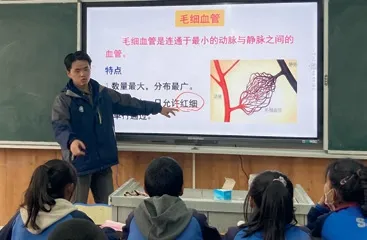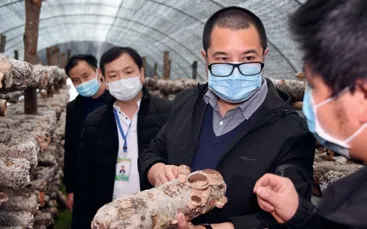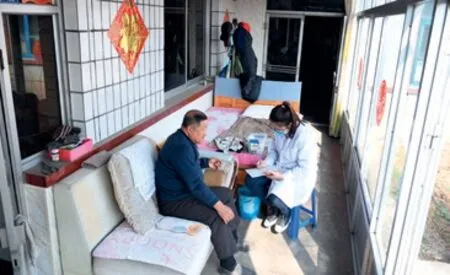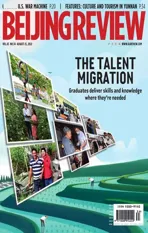GROWTH FROM THE GRASSROOTS
2022-08-24AnincreasingnumberofcollegegraduateschoosetoworkinruralareasByJiJing
An increasing number of college graduates choose to work in rural areas By Ji Jing

Shen Fuqiong, 33, has worked at a hospital on a 4,000-meter-high plateau for 13 years. In 2009, Shen chose to go to Maqiong Township in Ganze Tibetan Autonomous Prefecture, Sichuan Province, to work at the local hospital after graduating from university.
Her choice to work in the remote county was inspired by the Three Supports and One Assistance program, launched by the Central Government in 2006 to encourage college graduates to work in rural areas to support the development of education, agriculture and medical services (the Three Supports) and assist in poverty alleviation (the One Assistance).
Shen recalled that when she first arrived at the township hospital after a two-day bus ride, she found that there were only two doctors and there was no tap water or electricity.Although she had prepared herself mentally, she was still shocked by the conditions. She reminded herself that the harsher the conditions are,the more people need doctors.
As most residents of the township are of the Tibetan ethnic group, Shen has learned the Tibetan language to facilitate her communication with local patients. In 2016,she was appointed as head of the hospital.
Maqiong Township covers a vast, mountainous and sparsely populated area. This means reaching the hospital can be difficult for many and treatment is often delayed for those with sudden illnesses.
For this reason, Shen led her colleagues to compile health records of local residents to facilitate early intervention and treatment of common diseases. Every day she and some of her colleagues carried food and medical equipment to visit patients in remote areas and conduct checkups to assess their health. It took them 38 days to compile the health records of all local residents. Based on the records, she and her colleagues visit their patients regularly to provide treatment and deliver medicines.They have also spread medical knowledge and better awareness of insurance policies among residents.As a result, people’s health awareness has improved and many are coming to the hospital for regular checkups.
In recent years, a large number of college graduates have chosen to work in rural and remote areas. Since the launch of the Three Supports and One Assistance program, 469,000 college graduates have been selected to work in these areas, said Zhang Wenmiao, an official with the Ministry of Human Resources and Social Security (MHRSS) at a press conference in late July.
The program is becoming increasingly popular. In Henan Province, for example, Wang Zhiqiang, an official with the Provincial Department of Human Resources and Social Security, said the number of college graduates signing up for the program increased by seven times from 11,857 in 2015 to 93,255 in 2021.
Over time, the fields that graduates serve in have also expanded to areas such as culture and social security. The content of the program has also changed, with the concept of One Assistance changing from assisting in poverty alleviation to assisting in rural revitalization, as China eradicated absolute poverty in 2020.
Rural posts have provided great opportunities for college graduates to improve themselves and realize their personal value.
Zhao Jian signed up for the Three Supports and One Assistance program after graduating from Shanxi Agricultural University in 2010.
She became a veterinarian at the center for animal disease prevention and control in Jiancaoping District in Taiyuan, Shanxi Province.
Her job includes drawing blood from pigs to test for antibodies to see if the vaccinations they have received have worked. This is not an easy task as the veins of pigs are hard to find and they don’t cooperate. If the needle pierces the wrong spot and damages a pig’s intestines,it can hurt or even kill the pig. It requires both courage and skill to perform the task. After years of practice, Zhao is now able to find the vein and draw blood from a pig in just 20 seconds.
Many of her family and friends can’t understand her choice: working in sheepfolds and pigsties for a meager salary. However, Zhao said she loves her job and she has found her life’s purpose working as a vet.Because of her love for the job, she continued to work in the position after her service under the program had ended.
More opportunities
The central authorities are attaching increasing importance to programs encouraging college graduates to work in rural areas. This year, central authorities including the Ministry of Education (MOE) and the MHRSS have enhanced policy support for college graduates to work in these areas. The Three Supports and One Assistance program plans to recruit 34,000 graduates this year, 2,000 more than last year.
Two other programs are helping graduates support rural revitalization. The Special Posts Program plans to recruit 67,000 graduates this year. The program, which was also launched in 2006, recruits college graduates to teach in primary and junior middle schools in rural areas of west China. The Central Government set up a special fund to pay their salaries. In 2009, the program was expanded to include 22 provinces and autonomous regions in central and west China. The other program, the West China Program plans to recruit 36,700 graduates this year. Launched in 2003, it recruits college graduates and postgraduates to provide volunteer services in education, medical care, agricultural technology and poverty alleviation in west China for one to three years.

Zeng Chengqi, a college graduate recruited as a teacher under the West China Program, gives a class in Yushu, Qinghai Province, on April 20
The growing demand for medical and aged care and community services has created more job opportunities for college graduates.
Kong Ruiping, who graduated from Suzhou Institute of Trade and Commerce this year,has found a job with a village branch of the Communist Party of China, in Gaochun District of Nanjing, Jiangsu Province. “Last year I worked as a volunteer for COVID-19 pandemic prevention and control at a community for two months and realized the importance of community work. I hope to do my best to serve the residents,”Kong said.
Local governments are also creating more opportunities for college graduates to work in community services. This year, Ningxia Hui Autonomous Region launched a community service special plan to recruit 2,000 college graduates to work in community services and preschool education. Chongqing Municipality provides 2,100 posts in community services and Sichuan creates 6,500 posts for community COVID-19 prevention and control for college graduates.
Government and universities encourage students to pursue their goals by contributing to the country’s grassroots development.
The MOE came up with a 42-episode live-streamed course to provide employment guidance for this year’s college graduates. The series includes episodes such as Finding Grassroots Level Jobs to Realize Dreams and the series has been watched more than 120 million times.
The graduate school of China University of Geosciences in Wuhan, capital of Hubei Province has included topics about going to work in west China and working in rural posts into its course on career planning. More than 400 of the

Yin Pengxian (second right), Secretary of the Shaofangba Village Branch of the Communist Party of China, in Hanzhong, Shaanxi Province, in a mushroom greenhouse in March 2020. He applied to work in rural areas upon graduation with a Ph.D. degree

Sun Yi (right), a college graduate who works as a village doctor in Donggang, Liaoning Province,registers a patient’s health information on April 6, 2021
XINHUA school’s graduates this year will go to work in the west or in rural posts.
Improved treatment
The MOE, together with other departments, has required local governments and universities to improve assistance for college graduates working in rural and remote areas. In June, the MOE and the Ministry of Finance (MOF) issued a notice requiring local governments to ensure teachers recruited under the Special Posts Program be paid in full and on time and be covered by social insurance programs. Those who wish to stay after the three-year term should be allowed to do so as long as they pass a performance evaluation.
Earlier this year, four departments including the MOE and the Ministry of Civil Affairs issued a notice requiring local governments to provide tax and fee cuts and subsidies to graduates starting businesses in the community services field.
In June, the MHRSS and the MOF released a notice requiring local governments to continue to implement programs for improving the abilities of college graduates recruited under the Three Supports and One Assistance program. The Central Government will support the training of 8,000 such graduates this year and more than 60 percent of the training is on rural revitalization. Local governments will improve training for college graduates during their tenures to help their career development.
During their recruitment for the Three Supports and One Assistance program, Hubei and Hainan provinces have given preference to graduates who come from households which have just risen out of poverty.
Some local governments also provide social insurance and bonuses for those recruited under the program.Guangxi Zhuang Autonomous Region and Sichuan have provided them with major disease and accidental injury insurance. Yunnan and Guizhou provinces have offered them year-end bonuses or one-time rewards.
Shihezi University in Xinjiang Uygur Autonomous Region has given a prize of 283,000 yuan ($41,731)in total to the 70 graduates who chose to work in grassroots-level posts in the autonomous region this year. The university has also maintained close contact with former graduates to provide them with help when they are in need. BR
